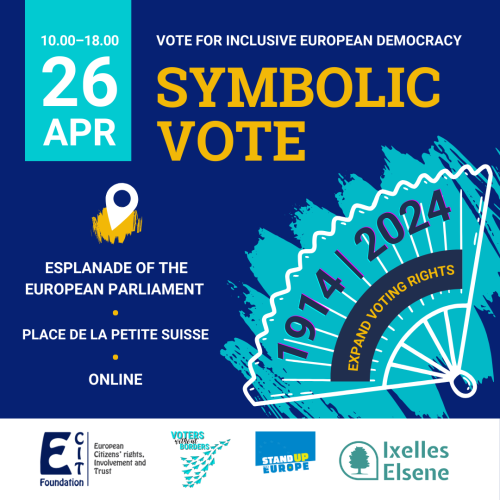
From 10.00 to 18.00 on 26 April 2024, ECIT Foundation, Voters Without Borders, and Stand Up for Europe will hold a Symbolic Vote in Brussels on the Esplanade of the European Parliament and Place de la Petite Suisse, close to ULB-Solbosch. There will also be an online version. For the first time in Belgium, 16-year-olds will be able to vote on 9 June.
Why not vote at 16 throughout EU-27 in the European elections? This will be symbolised by 27 green, yellow and red balloons.
Proposals to extend the franchise are part of the age-old struggle for democracy and universal suffrage. This upcoming 26 April will mark the 110th anniversary of the first symbolic vote by French women. Our stands will show the history and be linked to a parallel vote on the Place de la République in Paris and similar action in Berlin, Bologna, Geneva, London and other places to celebrate international Voting Rights Day.
This event is open to all, and in particular first-time voters from schools and universities. Please come and see us to chat, have fun and test out how to vote in the European elections and how European Parliament proposals for two votes — one national, one for European lists — would actually work.
You are asked to reply YES or NO to three questions on the ballot paper:
- Should votes at 16 be spread throughout the EU?
Following other EU Member States which had already lowered their voting age in the European elections — Austria (16), Malta (16) and Greece (17) — Belgium and Germany have introduced votes at 16 for the upcoming June elections. Why not introduce votes at 16 for all EU-27? ECIT brought a group of young Austrians to Belgium to explain their positive experience. There should be more such networking for equal rights among first-time voters. Lowering the voting age is on the agenda, but little is known about why and how it can work. A background paper by ECIT is currently being updated.
- Should EU citizens be able to vote and stand in all elections in their country of residence?
EU citizens have the right to vote and stand in local and European elections where they live, but not in other elections. Turnout of mobile EU citizens faces barriers and is well below the average in European elections (10% in the country of residence and 20% in the country of origin). Some EU citizens living outside the EU are even disenfranchised. Many cities would like to extend the franchise to foreign residents. The Brussels Parliament has demanded that voting rights be spread from the municipal to the city level. Further explanations from Voters Without Borders can be found on our website.
- Should the political rights of EU citizens be extended to all residents?
When the existing electoral rights were added 30 years ago with the creation of EU Citizenship by the Maastricht Treaty, the need to close the gap between mobile EU citizens and other residents was on the agenda. At least 12 Member States, including Belgium, have extended voting rights in local elections. Shouldn’t this be on the agenda again so that 13.7 million EU citizens and 23.7 third-country nationals have more equal rights throughout the EU? More can be found on the website of our partner VRAR (Voting Rights for All Residents).
The aim on this historic anniversary is to remind young people in particular to use of their vote, never to take it for granted and support those who do not even have the right. Defending democracy against external threats is a real concern but should be balanced by more emphasis on reinvigorating representative and participatory democracy from within by extending the franchise.
We are looking for your support for reforms which have been recommended by the old European Parliament, but which might be forgotten after the June elections. We will bring the results of your votes and wishes together in a report and petition to the European Parliament. We will be asking those just elected to take up the electoral reform agenda again and persuade the other EU Institutions and governments that it must be implemented!

Avec le soutien du Bourgmestre, de la Première Échevine en charge des Événements, de l’Échevine de l’Europe, et des membres du Collège des Bourgmestre et Échevins de la Commune d’Ixelles.
